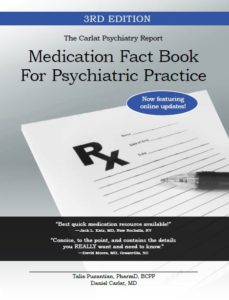The Medication Fact Book for Psychiatric Practice, Third Edition (2016)
PDF Access and CME Post-Test
Dr. Puzantian and Dr. Carlat have disclosed no relevant financial or other interests in any commercial companies pertaining to this educational activity.

PDF and E-Book Access to The Medication Fact Book for Psychiatric Practice, Third Edition (2016) and the 8 CME post-test
Download your PDF version.
Click here to download your PDF copy. Depending on your browser the book may open in a new window, tab, or appear in your downloads folder. This edition of the book is available to you as a purchaser. It may not be reproduced or distributed without permission of Carlat Publishing, LLC.
Online Updates:
ANTIDEPRESSANTS
Vortioxetine
Brintellix (vortioxetine) brand name changed to Trintellix by FDA.
Beginning June of 2016, the name Brintellix will no longer be used and vortioxetine will be marketed under the new brand name, Trintellix. This change was mandated due to reports of prescribing and dispensing errors between Brintellix and Brilinta, the antiplatelet medication ticagrelor. (Updated 5/11/16)
BENZODIAZEPINES
The FDA issued a black box warning about the dangers of combining benzodiazepines with opiates. In reviewing various sources of patient data, the agency found a concerning incidence of serious side effects with the combination, including profound sedation, respiratory depression, coma and death. The FDA stipulates that the benzo/opioid combination should be reserved for patients when alternative options have not worked, that you should minimize the dosage and duration of treatment, and that patients should be monitored closely for sedation and respiratory depression. While this warning applies to all benzodiazepines, it does not apply to all opiates. Of particular interest to psychiatrists, it does not apply to the opiates they are most likely to prescribe, namely those used for opioid addiction, such as buprenorphine/naloxone and methadone products. The FDA says it is not yet sure whether the risks are as high in such patients. (Updated 9/2/16)
ANTIPSYCHOTICS
Aripiprazole
FDA warning of rare impulse control problems with Abilify (Aripiprazole).
The FDA announced that in the 13 years since aripiprazole (Abilify) was approved, there have been 184 reports of new onset impulse-control problems in patients who were recently started on the antipsychotic. By far the most commonly reported problem was pathological gambling, (164 cases); other behaviors included compulsive eating (3 cases), spending (4 cases), sexual behaviors (9 cases). These behaviors stopped in most patients within days to weeks of discontinuation or dose reduction. (Updated 5/11/16)
Olanzapine
FDA warning of rare DRESS side effect from olanzapine (Zyprexa).
The FDA reported that 23 cases of DRESS (drug reaction with eosinophilia and systemic symptoms) have been reported with olanzapine worldwide since it was brought to market in 1996. DRESS often starts as a rash that may spread; presentation may include fever, swollen lymph nodes and face,and an elevated eosinophil count. The median time to onset of DRESS in these cases was 19 days after olanzapine was started. Median dose in these cases was 20 mg/day but DRESS was reported at doses as low as 5 mg/day. This is a rare side effect but potentially deadly. (Updated 5/11/16)
DEMENTIA
Primavenserin
Primavenserin (Nuplazid) was approved by the FDA for the treatment of psychosis associated with Parkinson’s disease. (Updated 5/11/16)
SUBSTANCE ABUSE
Buprenorphine
Matchstick-sized implant for the maintenance treatment of opioid dependence approved by FDA.
Buprenorphine (Probuphine) will be available as four, one-inch-long, soft, flexible rods that are surgically implanted under the skin on the inside of the upper arm once a patient has been stabilized on an oral dose (for at least 3 months). The implant will deliver a low-level dose of buprenorphine for up to six months (the equivalent of < 8 mg/day of oral buprenorphine). Response rates over six months were similar between implant and SL tablets (63% and 64%, respectively). Pain, itching and redness at site of insertion were the side effects reported most often with Probuphine. It offers convenience to patients but is also less likely to be abused or resold illicitly, but disadvantages may be complications from insertion and removal of the implant and the possibility that some patients will continue to need oral buprenorphine since the implant provides only a low dose. (Updated 7/6/16)


Newsletters
Please see our Terms and Conditions, Privacy Policy, Subscription Agreement, Use of Cookies, and Hardware/Software Requirements to view our website.
© 2026 Carlat Publishing, LLC and Affiliates, All Rights Reserved.

_-The-Breakthrough-Antipsychotic-That-Could-Change-Everything.webp?t=1729528747)



